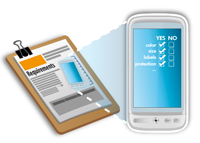 As an importer, you take responsibility for the safety of the products you sell on your market. In many countries, you hold the same liability as if you had manufactured the products yourself.
As an importer, you take responsibility for the safety of the products you sell on your market. In many countries, you hold the same liability as if you had manufactured the products yourself.
It means that, if you import sensitive products (children’s toys, electrical appliances, chemicals…) into Europe/North America/Australia, you are running serious legal risks.
The very least you should do is ask suppliers for certifications that were issued by recognized laboratories and that confirm the products you are buying are in compliance with the regulations of the country(ies) where you sell them.
Getting such a certification report is helpful…
It indicates that samples were sent to a lab and that the lab confirmed their compliance.
So you can check if the product and its components are the same as the samples certified by the lab. Doing this visually (without any test) is especially easy for electrical products because of the CDF.
As far as I know, a production certification doesn’t “expire” as long as the manufacturer uses exactly the same components and the same processes. So, if you work with honest people, this document will reduce your risks significantly.
… But it is not sufficient
You should be aware of a few realities:
- A product certification typically applies to a few samples that were sent before your production takes place. So they do not necessarily apply to your production. And the products that got certified might have been made in another factory!
- In China, manufacturers keep changing things — either because they don’t control their processes, or because they try to maximize their profit on every batch they make. So a certification from a previous batch applies to… that previous batch.
- The fact that the manufacturer was given a certificate for a product does not mean that all the samples they sent to the lab were compliant. They might have tried 10 times, and they got lucky the 10th time. This is especially true when a chemical analysis is involved.
- Many certifications and testing reports are “photoshopped”, and a call to the issuing lab can reveal that.
- Sometimes they are “real fakes” that were fabricated by a lab employee — which means the lab will find them in their database and confirm that they are legitimate. (Note that this happens even with “big name” labs, and it is less likely to happen in Hong Kong).
As I wrote before, European authorities will soon require test reports on every production batch, and will not accept certificates that don’t apply directly to each batch. Expect this to come into effect also in the US in a few years!
Overall, getting certifications and checking if the list of components is (or seems to be) the same is an important step. But do not think you are “covered” in case your products harm/kill people.
In the end, as the importer, you are responsible.
Disclaimer
We are not lawyers. What we wrote above is based only on our understanding of the regulatory requirements. QualityInspection.org does not present this information as a basis for you to make decisions, and we do not accept any liability if you do so.

Great post! It’s quite amazing that this topic is almost completely ignored by small buyers. Information on regulations is hard to find and the authorities in the various EU countries tend to be less than helpful. Not really sure how this will end, but either Chinese suppliers become compliant to a much larger degree (it’s 2014, and it’s still hard to find suppliers who are compliant) or importing from China will be exclusive to those businesses that are large enough to invest in a comprehensive quality assurance process.
It will also be interesting to see how this impact sites like Aliexpress and DHgate.
Thanks Fredrik.
Good points. The trend is definitely unfavorable to small buyers that don’t pay for any testing.